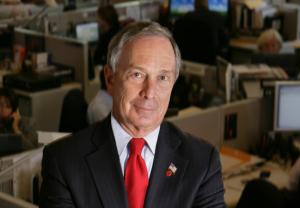On April 8th, 2015, the Wall Street Journal headline read "Bloomberg Criticizes New York Fracking Ban." During his interview, former New York Mayor Michael Bloomberg announced that he was donating an additional $30 million to the Sierra's "anti-coal" campaign, but that he also made special provision that none of his donated money would go to the Sierra Club's parallel anti-natural gas campaign. It seems that New York State has become a battleground for fossil fuels. In fact, given the blizzard of fracking stories, both pro and con, in the last few years, this seems like a perfect time to have a robust national debate on fracking.

Later on April 8th, Bloomberg joined environmental groups at the Sierra Club national news conference to announce his efforts to strengthen the Club's "Beyond Coal" campaign. The business magnate and politician turned philanthropist also said that a dozen other environmental backers have committed to another $30 million to match his funding. The goal is to have "fewer coal plants" in the US in fewer years.
On the one hand, Mayor Bloomberg has been advocating fracking and natural gas since 2012, when he co-authored a Washington Post Op-Ed piece with George P. Mitchell, entitled "Fracking is too important to foul up*;" on the other hand, the Sierra Club's Executive Director Michael Brune was quoted as saying at the April 8th press conference, "Our goal overall is to move beyond coal and gas and get to 100 percent clean energy. We think it's possible to have zero carbon in the energy sector by 2030, which means 'no coal and no gas.'"
No wonder the American people are confused. The fossil fuels debate just sounds like another partisan political campaign, but the stakes are huge, with the US's economic and environmental future may be hanging on this issue.
Certainly, there was much anti-coal rhetoric in the media on April 9th:
- "Michael Bloomberg Throws Another $30 Million at Sierra Clubs Anti-Coal Campaign," National Journal;
- "Michael Bloomberg's War on Coal," Politico;
- "Bloomberg Adds $30 Million to Anti-Coal Campaign," New York Times and Washington Post,
- With several even juicier headlines from CNN, Rolling Stone, Climate Progress, Huffington Post, Time Magazine, Washington Examiner, The Hill, Real Clean Energy, Associated Press, Sun Times, et al.
But only the Wall Street Journal, the New York Daily News and the New York Post reported on the Mayor's ongoing support of fracking and natural gas, which is almost solely because natural gas emits far fewer emissions than does coal and because it is here and now.
However, the Sierra Club, the NRDC, Greenpeace, Friends of the Earth, and many other national, regional and local environmental groups believe that the US can be free of fossil fuels for electricity by 2030. Although, Bloomberg, the Wall Street Journal, Federal Energy Regulatory Commission, the Environmental Protection Agency to name a few have concluded that natural gas and fracking are integral to maintaining reliable electricity in the US and most state utility commissions have used the increase in cheap natural gas to reduce emissions by replacing outdated coal plants with high efficiency natural gas plants.
According to Mayor Bloomberg, he favors natural gas "because there is no viable alternative to coal-fired electricity without gas." In another equally important story line, Bloomberg criticized the New York state's ban on hydraulic fracturing, saying that the move was "misguided" and instead New York should be touting the benefits of natural gas, especially up-state where it would create jobs and help supply electricity.
"To keep coal-fired power plants in upstate New York and not frack doesn't make any sense at all." Bloomberg points out that the economic and health benefits of natural gas, especially when compared with other fossil fuels like coal, outweigh the potential health impact he says can be prevented with tough regulation.
Without any government funding, indeed, in the face of government obstructions, fracking has changed the economic dynamic of the world in a positive way, helping to take much of the new energy production out of the hands of our enemies and marginal friends. Thanks to responsible hydraulic fracturing, the US has been able to access natural gas and tight oil previously unavailable, with few or no examples of groundwater or drinking water contamination, according to the EPA's own testing. Sorry, Josh Fox, the TV documentarian! Lighting water on fire is dramatic, but certainly not proof of groundwater contamination.
Given the fact that new efficient natural gas power plants have allowed the US to close down more than a 100 older coal-fired power plants and reduce greenhouse gases significantly in the last decade, maybe it is time that US should have a national debate, perhaps in a Senate Hearing with the klieg lights and cameras on, so that America can hear the best arguments from all parties, including the state and federal governments, the state and federal environmental and energy agencies, environmental groups and the private sector of the US economy. This debate over fracking and natural gas is "too important to foul up."
---
* Bloomberg and Mitchell encourage better state regulation of fracking around five key principles:
- Disclosing all chemicals used in the hydraulic fracturing process;
- Optimizing rules for well construction and operation;
- Minimizing water consumption, protecting groundwater and ensuring proper disposal of wastewater;
- Improving air pollution controls, including capturing leaking methane, a potent greenhouse gas; and
- Reducing the impact on roads, ecosystems and communities.
Stephen Heins is an energy and regulatory consultant for Tocqueville Asset Management, LLC of New York City. Previously, Heins was Vice President of Corporate Communication for Orion Energy Systems, a publicly-traded leader in innovating energy and lighting systems based in Manitowoc, Wis.
Lead image of Michael Bloomberg by Rubenstein [CC BY 2.0 (http://creativecommons.org/licenses/by/2.0)], via Wikimedia Commons.


